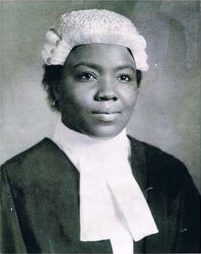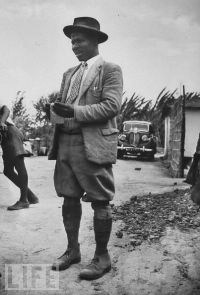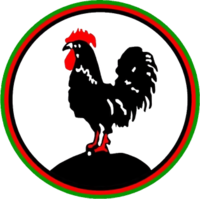The History of Malawi covers the area of present-day Malawi. The region was once part of the Maravi Empire. In colonial times, the territory was ruled by the British, under whose control it was known first as British Central Africa and later Nyasaland. It became part of the Federation of Rhodesia and Nyasaland. The country achieved full independence, as Malawi, in 1964. After independence, Malawi was ruled as a one-party state under Hastings Banda until 1994.

Politics of Malawi takes place in a framework of a presidential representative democratic republic, whereby the President of Malawi is both head of state and head of government, and of a multi-party system. Executive power is exercised by the government. Legislative power is vested in both the government and the National Assembly. There is a cabinet of Malawi that is appointed by the President of Malawi. The judiciary is independent of the executive and the legislature.

Hastings Kamuzu Banda was the leader of Malawi from 1964 to 1994. He served as Prime Minister from independence in 1964 to 1966, when Malawi was a Dominion / Commonwealth realm). In 1966, the country became a republic and he became the first president as a result, ruling until his defeat in 1994.
The Alliance for Democracy is a political party in Malawi that marked its history as laying the foundation for multi-party rule in Malawi. It began as an underground political movement during the Kamuzu Banda era and later evolved to a political party during the multi-party era under the leadership of trade union activist, Chakufwa Chihana. AFORD has a stronghold in the northern region. The president is Godfrey Shawa.
The People's Progressive Movement (PPM) is a political party in Malawi. At the elections of 20 May 2004, its candidate for president Aleke Banda won 2.5% and the party was part of the Mgwirizano Coalition, that won 27 out of 194 seats. Aleke Banda was the close friend of hastings Kamuzu Banda in 1956. He was among the people who founded the Nyasaland Congress Party. He was also saved as Ministry of Agriculture in the United Democratic Front (UDF) during Bakali Muluzi's time. He left UDF together with Mark Katsonga Phiri and formed their party after there was disagreement with Muluzi about the Presidency of Bingu wa Munthalika.

John Zenus Ungapake Tembo was a Malawian politician who served for years as President of the Malawi Congress Party (MCP). Tembo comes from the Dedza District in central Malawi, and he was a teacher by profession. Beginning in the 1960s he was an important politician in Malawi, and he was a key figure in the regime of Hastings Banda (1964–1994). He has been variously described as "physically slight, ascetic, fastidious" and "cunning". He was replaced as President of the MCP in August 2013.

Gwandaguluwe "Gwanda" Chakuamba Phiri was a Malawian politician who was the leader of the New Republican Party (NRP). He hailed from Nsanje, a district on the southern part of Malawi. Gwanda Chakuamba attended Zomba Catholic Secondary School, a 2 year metriculation at Sulosi College in Bulawayo Zimbabwe before proceeding to the US to study law though not much is known about whether he did a degree program or a short course.
The Nyasaland African Congress (NAC) was an organisation that evolved into a political party in Nyasaland during the colonial period. The NAC was suppressed in 1959, but was succeeded in 1960 by the Malawi Congress Party, which went to on decisively win the first universal suffrage elections in 1961, and to lead the country to independence as Malawi in 1964.
Henry Masauko Blasius Chipembere was a Malawian nationalist politician who played a significant role in bringing independence from colonial rule to his native country, formerly known as Nyasaland. From an early age Chipembere was a strong believer in natural justice and, on his return in 1954 from university in South Africa, he joined his country's independence struggle as a nationalist strategist and spokesman. In 1957, considering that the independence movement needed a strong leader similar to Kwame Nkrumah, and considering himself too young for this task, he joined with other young nationalists in inviting Hastings Kamuzu Banda to return to Nyasaland as the movement's leader.
Justin Chimera Malewezi was a Malawian politician and a Member of Parliament for Ntchisi North in the Central Region of Malawi. He was Vice-President of Malawi from 1994 to 2004. Malewezi quit the United Democratic Front in 2004 and eventually represented the People's Progressive Movement in the 2004 general election, in which he garnered 2.5% of the total national vote.

Cecilia Tamanda Kadzamira, GCVO was the official hostess of Malawi during the reign of president Hastings Banda. Whilst she and Banda were not officially married, she served as the first lady or official hostess for several years. For several years, she was the most powerful woman in Malawi. Kadzamira, is referred to as "Mama", or "Mother of the Nation".

Orton Chirwa was a lawyer and political leader in colonial Nyasaland and after independence became Malawi's Minister of Justice and Attorney General. After a dispute with Malawi's autocratic President Hastings Kamuzu Banda, he and his wife Vera were exiled. After being kidnapped abroad they were tried in Malawi on charges of treason and sentenced to death. Amnesty International named the couple prisoners of conscience. After spending nearly eleven years on death row in Malawi, Orton Chirwa died in prison on 20 October 1992.

Vera Mlangazua Chirwa is a Malawian born lawyer and human and civil rights activist. She was Malawi's first female lawyer and a founding member of the Malawi Congress Party and the Nyasaland African Women's League. She fought for multiparty democratic rule in Malawi and was charged with treason, tried and sentenced to death by President Kamuzu Banda. She spent 12 years on death row. She was married to lawyer Orton Chirwa, Malawian Minister of Justice and Attorney General, who later died in prison.

James Frederick Sangala was a founding member of the Nyasaland African Congress during the period of British colonial rule. Sangala was given the nickname "Pyagusi", which means "one who perseveres".

Nancy Tembo is a Malawian politician and serves as Minister of Foreign Affairs in the Malawi Government since 2022. She is also a Member of Parliament (MP) representing Lilongwe City South West constituency in the National Assembly of the Republic of Malawi.

Lazarus McCarthy Chakwera is a Malawian politician and theologian who has served as President of Malawi and minister of defence since June 2020. He also serves as minister of defence per Malawian constitution, he has served as the leader of the Malawi Congress Party since 2013. He was President of the Malawi Assemblies of God from 1989 to 2013.

The cabinet crisis of 1964 in Malawi occurred in August and September 1964 shortly after independence when, after an unresolved confrontation between the Prime Minister, Hastings Banda and the cabinet ministers present on 26 August 1964, three ministers and a parliamentary secretary were dismissed on 7 September. These dismissals were followed by the resignations of three more cabinet ministers and another parliamentary secretary, in sympathy with those dismissed. Initially, this only left the President and one other minister in post, although one of those who had resigned rescinded his resignation within a few hours. The reasons that the ex-ministers put forward for the confrontation and subsequent resignations were the autocratic attitude of Banda, who failed to consult other ministers and kept power in his own hands, his insistence on maintaining diplomatic relations with South Africa and Portugal and a number of domestic austerity measures. It is unclear whether the former ministers intended to remove Banda entirely, to reduce his role to that of a non-executive figurehead or simply to force him to recognise collective cabinet responsibility. Banda seized the initiative, firstly, by dismissing some of the dissidents rather than negotiating, and secondly, by holding a debate on a motion of confidence on 8 and 9 September 1964. As the result of the debate was an overwhelming vote of confidence, Banda declined to reinstate any of the ministers or offer them any other posts, despite the urging of the Governor-General to compromise. After some unrest, and clashes between supporters of the ex-ministers and of Banda, most of the former left Malawi in October with their families and leading supporters, for Zambia or Tanzania. One ex-minister, Henry Chipembere went into hiding inside Malawi and, in February 1965 led a small, unsuccessful armed uprising. After its failure, he was able to arrange for his transfer to the USA. Another ex-minister, Yatuta Chisiza, organised an even smaller incursion from Mozambique in 1967, in which he was killed. Several of the former ministers died in exile or, in the case of Orton Chirwa in a Malawian jail, but some survived to return to Malawi after Banda was deposed and to return to public life.

Khumbize Kandodo Chiponda is a Malawian politician. In 2020 she became Minister of Health in Malawi.
Timothy Mtambo of Chitipa is a Malawian politician and serves as Minister of Civic Education and National Unity in Malawi government since 2020. Prior to active politics, Mtambo was a human rights activist. He is mostly known for the role he played by leading demonstrations against the regime of President Peter Mutharika, accusing the regime of nepotism and corruption. Mtambo also holds the position of Commander in Chief of Citizen for Transformation Movement (CFT).













